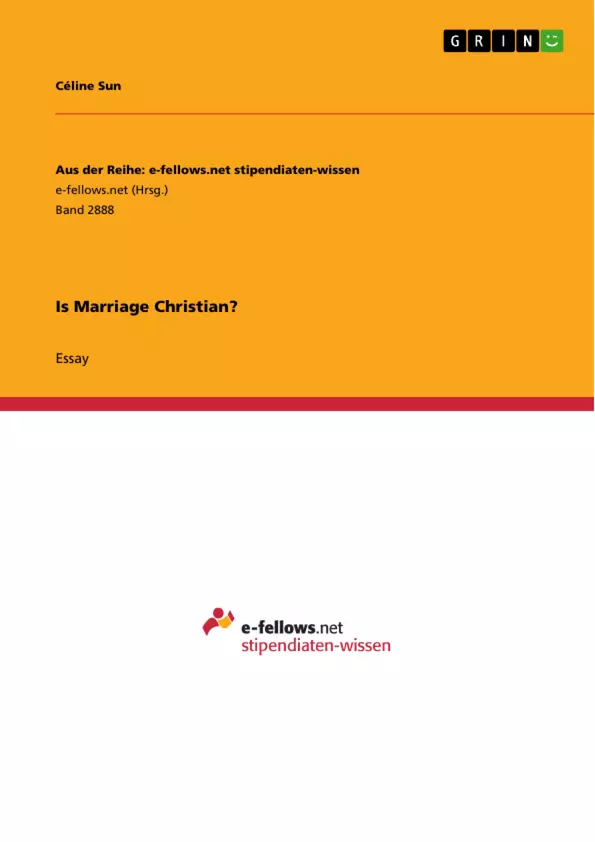This essay argues that marriage is Christian because there is a specifically Christian theology of marriage that understands its nature as sacramental. For a great part of the Christian tradition, marriage has been dismissed or regarded as inferior in favour of celibacy. It is possible, however, to have a thoroughly positive understanding of marriage alongside celibacy.
I will examine this question by looking at two key examples in the Christian tradition, Gregory of Nyssa’s On Virginity and St. Augustine of Hippo’s The excellence of Marriage. For Nyssa, celibacy seems to be the ideal. I will show that his treatment is more complex than this; it is clear, however, that he does not regard marriage as in the sense of having a positive theology of it. Augustine, on the opposite, advocates for an understanding of marriage as a good way of Christian life, but still insists on its inferiority to celibacy. I will show, however, he opens a way that allows a development of theological interpretation of marriage as a sacrament of love. I will argue that as a sacrament of love, marriage does not have to be sacrificed in favour of celibacy but neither should it be regarded as an inferior good compared to celibacy.
The predominantly negative view of marriage in both authors is influenced by their (partly unconscious) engagement in the Mystic and/or Gnostic traditions. I will argue that both authors neglect the crucial aspect of love in marriage which stems from the reluctance to regard the spiritual and bodily dimensions of love as inseparable. This is caused by the negative view of the embodied world and sexuality, which leads to an impoverished notion and a diminished role of love that is not appropriate with regard to man’s embodied nature and destroys the possibility of understanding marriage as an active, positive participation in God’s love.
Inhaltsverzeichnis (Table of Contents)
- Introduction
- Part I: Gregory of Nyssa.
- Virginity of the Soul
- Marriage as Functional
- The Worldly Dimension
- Part II: St. Augustine of Hippo
- Procreation (and Social Bond)
- Mutual fidelity
- Sacramental bond.
- Part III: Developing from the Classic Theologies
- Embodiedness and Sexuality.
- Trinity and Community ....
- Part IV: Marriage as a Sacrament of Love.
- Commitment and indissolubility.
- Shared transcendence..\li>
- Incarnational expression.
- Creativity..\li>
- Charity and virtues.
- Conclusion
Zielsetzung und Themenschwerpunkte (Objectives and Key Themes)
This essay aims to demonstrate that marriage is inherently Christian due to its sacramental nature within the Christian theology. The author explores the complex relationship between celibacy and marriage, challenging the often-held view of celibacy as the superior state. The text examines the perspectives of two prominent figures, Gregory of Nyssa and St. Augustine of Hippo, who represent contrasting viewpoints on the theological understanding of marriage.
- The nature of marriage as a sacrament of love
- The influence of mystical and gnostic traditions on the views of marriage
- The importance of embodiedness and sexuality within Christian theology
- The contrasting perspectives of Gregory of Nyssa and St. Augustine of Hippo on marriage and celibacy
- The role of procreation, fidelity, and the sacramental bond in marriage
Zusammenfassung der Kapitel (Chapter Summaries)
Introduction
The introduction establishes the argument that marriage is Christian due to a specific theological understanding of its sacramental nature. It highlights the historical tendency to favor celibacy over marriage within the Christian tradition and introduces the two key figures whose works will be examined: Gregory of Nyssa and St. Augustine of Hippo.
Part I: Gregory of Nyssa
This part focuses on Gregory of Nyssa's perspective on marriage. The author explores his view of the "virginity of the soul" and how it relates to celibacy and marriage. Nyssa's understanding of marriage is presented as functional rather than inherently positive, primarily emphasizing procreation as its primary good.
Part II: St. Augustine of Hippo
This section delves into St. Augustine's treatise on marriage, analyzing his response to the ongoing theological debate on the merits of celibacy and marriage. Augustine identifies three essential goods of marriage: procreation, mutual fidelity, and the sacramental bond. The chapter elaborates on each of these aspects, outlining Augustine's theological interpretation of marriage.
Schlüsselwörter (Keywords)
The text focuses on the key concepts of Christian theology, marriage, celibacy, sacramentality, embodiedness, sexuality, procreation, fidelity, and the views of Gregory of Nyssa and St. Augustine of Hippo.
Frequently Asked Questions
What is the central argument regarding marriage and Christianity?
The essay argues that marriage is inherently Christian because it possesses a sacramental nature as a "sacrament of love" within Christian theology.
How did Gregory of Nyssa view marriage?
Gregory of Nyssa viewed marriage as functional, primarily for procreation, but he regarded celibacy (the "virginity of the soul") as the superior spiritual ideal.
What are the three "goods of marriage" according to St. Augustine?
St. Augustine identified procreation, mutual fidelity, and the sacramental bond as the three essential goods that justify marriage as a Christian way of life.
Why was marriage often seen as inferior to celibacy in early tradition?
Influences from Mystic and Gnostic traditions led to a negative view of sexuality and the embodied world, causing many theologians to favor celibacy over marriage.
Can marriage and celibacy coexist as positive theological concepts?
Yes, the essay argues for a positive understanding of marriage that does not need to be sacrificed in favor of celibacy, recognizing both as participations in God's love.
What is the role of "embodiedness" in this theological discussion?
The text highlights that spiritual and bodily dimensions of love are inseparable, making the embodied nature of marriage an active expression of faith.
- Quote paper
- Céline Sun (Author), 2018, Is Marriage Christian?, Munich, GRIN Verlag, https://www.hausarbeiten.de/document/448970


